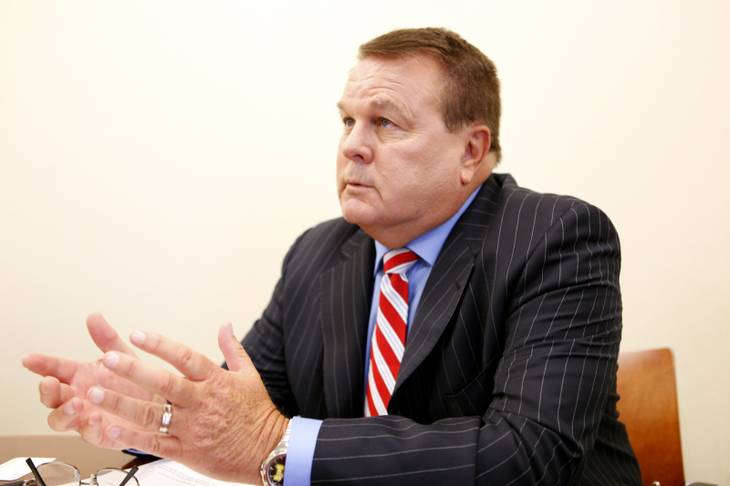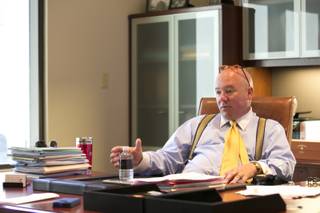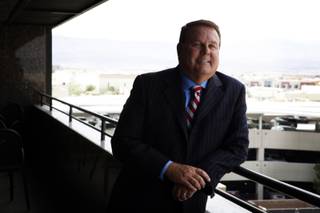Serving as a general counsel attorney for a major gaming company might be one of the most demanding jobs in the world.
From lawsuits to labor strikes and a lagging economy, the job demands thick skin and endless endurance.
Tim Donovan and Brian Larson are two of the best.
As general counsel for Caesars Entertainment, Donovan and his staff recently won an American Lawyer Media award, naming them one of the best legal departments in the country.
As Boyd Gaming’s lead attorney, Larson has helped the company blossom from a locals casino to a national contender with properties across the country.
What is it like to hold one of the most high-pressure positions in Las Vegas? Both lawyers let VEGAS INC shadow them for a day.
TIMOTHY DONOVAN, general counsel, Caesars Entertainment
Timothy Donovan’s day starts early. He usually is out of bed by 5:30 a.m., ready to take phone calls from lawyers in Hong Kong.
Since Steve Wynn and Sheldon Adelson made their fortunes in Macau, Caesars Entertainment has been looking to set up shop in Asia. Donovan studies every detail of every potential deal. He must recognize potential issues and pull from several legal specialties: gaming, labor and human resources law.
“You have to be a generalist,” Donovan said.
From a cozy office on the second floor of the Palace Tower at Caesars Palace, Donovan spends much of his day talking on the phone, pouring over documents and shoveling through emails. There often are too many to answer in a single day.
As one of the top 20 hotel companies in the world, Caesars Entertainment controls more than 40,000 rooms, 100,000 employees, 40 casinos and hundreds of restaurants in 14 jurisdictions. With so many moving parts, Donovan and his team of 25 lawyers have to manage a complex balance sheet.
“This job is the most challenging from a legal standpoint,” Donovan said. “We are a conglomeration of a bunch of sub businesses. Each one comes with their own challenges.”
Before joining Caesars in 2009, after a short stint as general counsel of Florida’s Allied Waste, Donovan specialized in mergers and acquisitions. Simply put, he spent his time making deals.
The general counsel job at Caesars demands that Donovan do that but adds much more to his plate. He jumped into an industry he knew little about. It was baptism by fire, Donovan said, but he learned quickly. He had to.
Every day doles out a new challenge. Donovan handles regulatory issues, customer disputes, slips and falls, contract negotiations.
“You touch virtually every aspect of the company,” Donovan said. “You’re involved in human resources. You’re involved in gaming. You’re involved in labor. You’re involved in strategy, development, compensation plans.”
Then there’s litigation.
Caesars currently is embroiled in about 1,000 lawsuits, Donovan said, a much smaller number than the company has dealt with in the past. He would not comment on any cases specifically, but said most are routine, involving perhaps people falling in a casino or losing lots of money and refusing to pay.
Those cases are small potatoes, Donovan said. Not much cash is involved.
It’s the bigger litigation – cases that involve securities law or failed projects – that puts Caesars under pressure. A single one could set the company back millions.
Failed deals have been a running theme in Donovan’s case files, mostly due to a struggling economy. Caesars has done lots of development in partnership with other companies. Some feel they were misled after Caesars severed ties. Many have sued for breach of contract.
But the company has had lots of luck defending against those cases.
“We’ve won all of those,” Donovan said.
When deciding how best to handle a case, Donovan, like most attorneys, starts with a cost analysis. How much it would cost to defend the lawsuit versus settle it? The smaller number almost always wins.
Since some cases involve millions of dollars, Donovan is under a lot of pressure to make the right decision. The last thing a major company wants is a bad judgement to its name.
Donovan spoke generally about some of his projects.
Ever since moving to Las Vegas, Donovan has been trying to find a buyer for Caesars’ $578-million golf course in Macau. When the company bought the 175-acre plot in 2007, it hoped to use the land to build a casino and land a foothold in the world’s fastest-growing gaming market.
But Caesars never got the permissions they needed to build the casino. Company officials made plans to sell the course and use the cash to make a small dent in Caesars’ massive $20-billion debt load.
“I’ve been seeking opportunities to sell that to the right persons,” Donovan said.
Donovan also has been busy nailing down a Massachusetts gaming license for Caesars and a partner. Lots of work has gone into ironing out that relationship and learning Massachusetts law, he said.
Local issues have been on Donovan’s mind, too.
The big one lately is completion of the Linq, Caesars’ outdoor shopping and entertainment development between the Flamingo and Quad. Donovan spends a good amount of time keeping tabs on its progress and making sure everything is in line.
For the past couple of months, negotiations with the Culinary Union also have been the focus of at least two meetings a week.
But Caesars’ top priority is entering the Asian market. Donovan and his team always keep an eye open for potential opportunities there, both in and out of gaming.
“It’s important for us to get in Asia,” he said.
Potential opportunities go through an extensive vetting process.
A team of private detectives, who report directly to Donovan, investigate every person and company Caesars considers doing business with. The corporate sleuthing – making phones calls, running background checks, analyzing financial records – takes a lot of time.
But the work pays off.
In the three years that Donovan has worked at Caesars, he has carved out a name for himself as one of the best corporate lawyers in the country. With 32 years of practice under his belt, Donovan chalks up his success to experience.
“What really evolves is your maturity,” he said. “Early on, you’re reluctant to rely on your common sense. The more secure you get, the more efficient you become. You say, ‘You know? I know I’m right on this.’”
Earlier this year, American Lawyer Media named Donovan and his team one of the “Best Legal Counsels” in the world. Judges cited the lawyers’ handling of complex mergers, lawsuits and more than 75 collective bargaining agreements across the United States.
The recognition was Donovan’s proudest moment, he said, a huge accomplishment for guy who originally wanted to play piano in a rock ’n’ roll band. He decided to got to law school only after discovering how tough life on the road is.
Donovan says it helps to have great team members. They double check each other’s work, offer feedback and help make sure everyone is doing a thorough job.
Being thorough is perhaps the most important of Donovan’s roles. The last thing he wants is an angry phone call from his boss, Caesars CEO Gary Loveman.
Loveman typically calls Donovan once a day. But sometime, six phone calls are far from unheard of.
Though he’s a lawyer, Donovan often acts as a sounding board for his boss.
“He uses me more as a counselor, someone he can bounce ideas off,” Donovan said. “If he is troubled by something, he calls me.”
Sometimes the calls come on weekends, when Loveman tends to catch up on work. Donovan is unfazed. You don’t get into the gaming business if you want to work less.
When Donovan does get time to himself, he spends most of it on horseback. He got hooked on riding when he worked in Columbus, Ohio, where thousands of people each year go for the biggest equestrian show in the world, and he now has five horses.
“When I’m on the back of a horse, I usually forget about everything,” Donovan said.
Until his phone rings.
BRIAN LARSON, general counsel, Boyd Gaming
When Brian Larson joined Boyd Gaming as general counsel in 1990, Boyd was a private company with four properties in Las Vegas. Today, the publicly traded company operates 22 properties, 13 out of state and nine in Nevada.
Larson helped pull many of the casinos under Boyd’s umbrella.
“A lot has changed,” Larson said. “And it has changed dramatically.”
One thing that hasn’t changed is Larson’s drive. He always has been a morning person, getting up by 5:30 a.m. and arriving at his modest Spring Valley office before 7 a.m. That’s when it is quietest, and he can get things done.
But as Boyd has expanded to the East Coast – the company’s Atlantic City resort, the Borgata, is its most profitable – the phone has started ringing earlier and earlier.
“People on the East Coast know I get in early,” Larson said. “So they call.”
Larson tries to flip through the newspaper every morning to catch news that might affect the company: litigation in the gaming industry, new deals and developments in Las Vegas or elsewhere.
The biggest trend he has noticed in his 20-plus years of practice: more people suing.
“I think it has becoming more and more of a sue-happy city,” Larson said. “The amount of litigation has increased here, and it has increased in other jurisdictions. Some of the verdicts that have come here have been extraordinary. It really makes it an anti-business environment. I think it also hurts the state. You want to keep the companies that are here, and you want to attract new companies to come here.”
One such case wrapped up in 2003, when a Clark County District Court jury ruled that the Venetian should pay a London contractor, Lehrer McGovern Bovis Inc., $44.2 million in one of the biggest breach of contract cases in Las Vegas history. Companies have become more conscious of the details of deals ever since, Larson said.
Larson wouldn’t comment on the number of lawsuits in which Boyd is involved. The company made headlines in early June when a Clark County judge denied its attempt to end a $75-million lawsuit filed by the families of two workers who died on the job at the Orleans six years ago.
Larson also declined to comment on any ongoing cases, although he did say the number of cases hasn’t significantly ballooned in recent years.
“When I started here, there were maybe 150 lawsuits,” he said. “We haven’t gotten proportionally larger in terms of the number of suits.”
What has ballooned is the number of emails in Larson’s inbox. On an average day, he receives more than 200 messages. By the time he wakes up in the morning, he already is behind.
Larson’s legal background compels him to limit the number of emails he sends out. Discovery laws can turn emails against a lawyer in the heat of litigation, so Larson prefers to pick up the phone if there’s a important issue to discuss.
Boyd’s legal team includes 10 lawyers, six of who work in Las Vegas. Some specialize in development and intellectual property, others focus solely on litigation.
It helps to have a legal team with a wide range of expertise, Larson said. When a company employs 25,000 people and welcomes countless more to its properties every day, there’s no telling what can go wrong.
Larson’s job calls for lots of coordination. On average, he holds two meetings a day to stay on top of issues. When he’s making a deal, he plans daily conversations with practically every department: human resources, regulations, legal, accounting, public affairs.
Larson also reads hundreds of pages of documents, everything from drafts of contracts to lawsuits to correspondence.
He has had laser eye surgery twice.
“I never had bad eyesight before I started practicing law,” Larson said.
But staying on top of paperwork has to be a priority. It could mean the difference between being a dealmaker or a dealbreaker.
Larson said his proudest moment came July 1, 2004. That’s when Boyd announced it would acquire Coast Casinos for $1.4 billion. The transaction added four Las Vegas properties to Boyd’s portfolio: the Gold Coast, Orleans, Suncoast and Barbary Coast.
It was the hardest Larson had ever worked on a deal. Starting in January 2004, he worked close to 16 hours a day, every day, for almost six months until the deal closed. His lightest days, Sundays, called for four hours at the computer.
“The hours are really, really tough,” Larson said. “But the thing that really gets me going is when we’re doing the deal. It’s fun for me, and it gets your adrenaline going.”
Larson knows all about endurance.
He started running in law school to stay in shape but soon became a competitive runner. He competed in the Olympic Trials in 1988 and 1992.
Larson ran upwards of 120 miles a week. He wanted to get better and beat his best times. He kept running through his 30s.
When the Olympic Trials rolled around again in 1996, the same year Larson turned 40, he planned to compete again. Until he tore his Achilles tendon.
He eventually tore it a second time and developed back problems. He underwent two ankle surgeries, a knee surgery and a back surgery.
“I just had to quit,” Larson said. “My back has a lot of titanium in it.”
Today, Larson has traded long distance running for aqua jogging. It’s easier on his embattled joints.
But he still carries the endurance he built as a runner in his career as a lawyer. It helps him get through the long nights, the thick documents and the phone calls from his boss, Boyd CEO Bill Boyd.
Larson is always happy to have the work, though.
“It’s something that I enjoy,” he said. “It’s the right atmosphere for me.”


